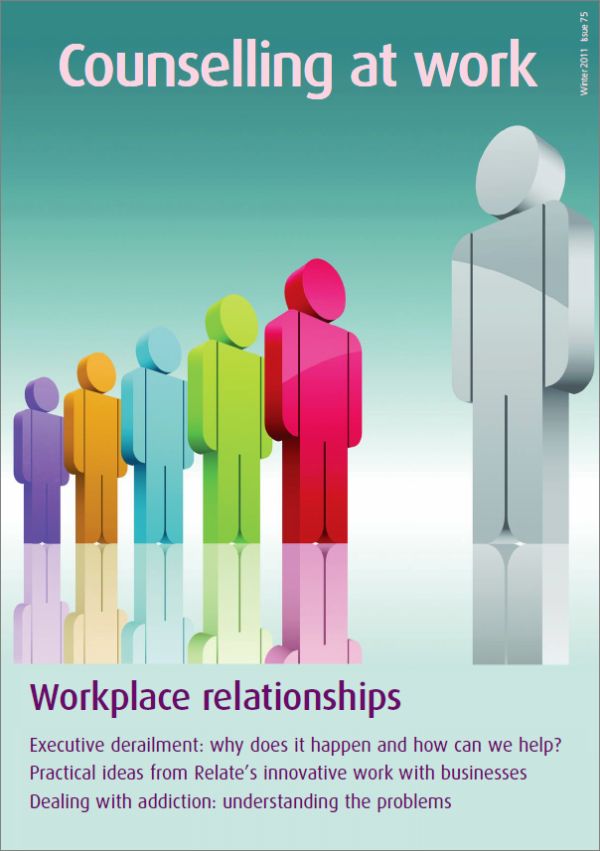In this issue
Derailment and personality
Michael Walton considers the success ‘traps’ awaiting senior executives
Relate
Rosie Fermin highlights the charity’s innovative work with businesses
Addiction
Richard Cross introduces the work of the United Kingdom Addiction Services Support Agency
Adding it up
James Rye calculates how many hours we need to work
The interview
Elspeth Schwenk: BACP governor and would-be Jedi Knight
LinkedIn
Andrew Kinder champions the use of networking websites
Health and wellbeing
Matt Smith-Lilley summarises the Health and Wellbeing Survey of Employers report and its findings
Legal issues
A new book in the BACP legal resources series
Divisional news and chair’s report

Articles from this issue are not yet available online. Divisional members and subscribers can download the pdf from the Counselling at Work archive.
First words
There’s nothing better than a good relationship. Hopefully, they’re all around us. Relationships at home, with our partners or friends and with our work colleagues. They say you can’t choose your family though, and thinking about it, you can’t really choose your work colleagues either.
As a journal dedicated to the workplace, it’s interesting to reflect on a number of themes over the years that involve how we get on, or don’t, with people at work. Organisations are made up of people with complex, diverse and sometimes dysfunctional personalities and characteristics. We need to get on with people in order to do our jobs but it’s not always quite so easy as that. Humans are designed with a bottom lip so we can bite them now and again… to keep quiet, keep the peace and keep things together until we’re at home, when presumably the cat gets the brunt of it.
The theme for this issue is ‘Relationships at Work’. I’m delighted to welcome back Michael Walton who contributes a fascinating article on the personalities of senior executives and the potential for their own ‘derailment’. He’ll be back in the spring issue with part two.
BACP has always had a close relationship with Relate and both organisations shared office premises in Rugby in the early days. Rosie Fermin explains how Relate, the ‘largest provider of relationship support’, is extending its reach into the corporate community to support employee health and wellbeing, to provide training and CPD for professionals and an innovative service called ‘Live Chat’.
Addiction could be interpreted as an individual’s relationship with a dysfunctional self. But the causes are hugely complex as are the challenges for rehabilitation and recovery. Richard Cross gives us an insight into addictions in the workplace as he explains the work of the United Kingdom Addiction Services Support Agency (UKASSA) which he founded after battling his own addictions.
Thanks also to James Rye, who’s written a fascinating article about how much freelance private practitioners need to earn from client work to generate a desired level of income. Money can be a bit of a taboo issue for counsellors; we don’t like to talk about such things, yet we all need to earn a living. Financial recompense also helps to validate what we do and reflect the professionalism, the skills and expertise we offer our clients; call this our relationship with money.
In our Interview, I’m pleased to welcome Elspeth Schwenk. Elspeth probably won’t need much introducing to you. She’s been a champion of BACP Workplace and the workplace counselling community for many years and is now one of the BACP Governors. So it is with a humble bow and tap to my cap that I say ‘Welcome Ma’am’.
Relationships are forming in a new world, otherwise known as cyberspace. Social and professional networks are flourishing, as people connect and network with others via the internet. Andrew Kinder hopes to tempt you to join him and the 140 or so ‘members’ of the BACP Workplace LinkedIn forum. It’s a great place to discuss work issues.
Thanks also to Matt Smith-Lilley, Policy Officer in BACP’s Policy Unit, who has summarised the Government’s response to Dame Carol Black’s 2008 review, essentially the relationship with and between health and wellbeing in the workplace.
A final thank you to book reviewers, Adrian Pepper and Margaret Chapman.
One particular relationship I have cherished over the last eight years editing this journal has been with our subediting and design supremo, Fran Shall. Through thick and thin, Fran has helped to develop this splendid publication for you, evolving the style and design to what you see before you here today. She’s picked up my errors, highlighted my typos and instinctively brought to the table a bevy of images, illustrations and design options which make the production of this journal an absolute doddle. No, this is not an obituary; rather, it is a simple public thank you from me to her for her expertise, friendship, support and professionalism over the years. BACP divisional journals will soon be produced by a different design agency.
I’ll sign off for now. If I don’t finish writing this piece, the dinner will be in the dog and I’ll be looking for a new relationship myself.
I hope you enjoy this issue.
Rick Hughes
Editor
